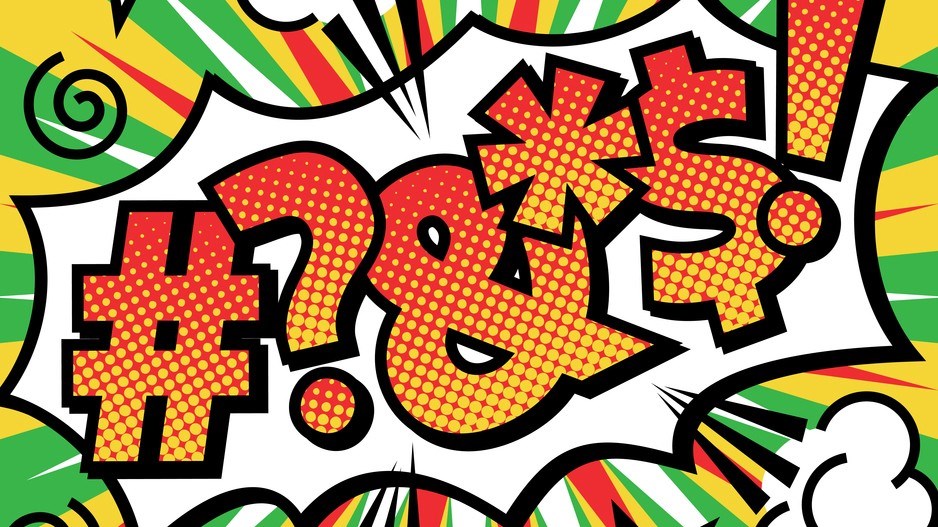Earlier this year, a Research Co. survey found that almost two-thirds of Canadians (64%) witnessed someone swearing in public. The poll was an early effort to look at the state of manners in our country and pinpoint some regional and generational differences.
There are many reasons that compel Canadians to swear. There is a difference in the words that we might use or hear when someone cuts us off the road while driving, or to describe the disappointing actions of a co-worker to a supervisor.
This time, we asked Canadians about the words they hear and the words they use in four different types of conversations that may happen throughout the course of a regular day. The results show that there are situations where familiarity enables us to curse, and others where manners seem to prevail.
For starters, more than half of Canadians say they hear swear words “frequently” or “occasionally” when they are talking with friends (68%), strangers (55%), relatives (53%) and co-workers (52%).
While more than one in four Canadians (27%) say they never hear curse words in the workplace, the proportion drops when it comes to listening to relatives (15%), strangers (14%) and friends (10%).
In three provinces – British Columbia, Saskatchewan and Manitoba – seven in 10 residents (70%) report hearing swears from their friends “frequently” or “occasionally.” The most bleepable workplaces appear to be located in Ontario, where 54% of residents say their co-workers swear.
The first question deals with what we remember hearing. When it comes to our own choice of words, most Canadians (52%) admit to uttering swears “frequently” or “occasionally” when they are having a conversation with friends, but fewer say they rely on curse words when chatting with relatives (40%), co-workers (34%) and strangers (23%).
There is an elevated sense of caution in specific circumstances. Half of Canadians (49%) say they never swear when talking to strangers and two in five (41%) say they never swear when talking to co-workers.
British Columbians lead the entire country in relying on swear words “frequently” or “occasionally” when talking with friends (56%). Residents of Manitoba and Saskatchewan are first on personal swearing with relatives (45%), co-workers (41%) and strangers (26%).
Age is a factor in what we say, more than in what we hear. Canadians aged 18 to 34 are decidedly more likely to swear when chatting with friends (73%), relatives (55%), co-workers (47%) and even strangers (33%) than their older counterparts.
There is no definitive rule on when and how it is acceptable to swear. Almost half of Canadians (48%) admit that they sometimes alter the way they speak so as not to swear in front of certain people. The proportion of “conditional” swearers is highest among the youngest adult age group (57%) as well as residents of Saskatchewan and Manitoba (52%), Ontario (50%) and British Columbia (50%).
Just under two in five Canadians (38%) say they always modify the way they speak to make sure they do not swear in public. This very polite group encompasses 40% of women, 42% of baby boomers and 43% of Quebecers.
This leaves a small proportion of Canadians (14%) who claim to never alter the way they speak, and who simply do not worry about it if a swear word comes out.
On a political basis, there is no difference in the public behaviour of Liberal and Conservative voters when it comes to swearing. Equal proportions of supporters of either party in the last federal election “always” (43%), “sometimes” (43%) or “never” (14%) change the way they speak.
New Democratic Party (NDP) voters – who can point to these findings as proof of their long-standing assertion that Canada’s two major parties are the same – are less likely to “always” change their words (31%) and more likely to “sometimes” do so (58%).
Two findings leave us asking more questions. First, the gender gap is exceptionally pronounced when it comes to swearing in the workplace. While 46% of women say they never curse when chatting with co-workers, the proportion drops to 35% among men. This might point to men being more likely to get away with “locker room” talk.
Second, those in the 18-to-34 age group are the least likely to say that they never change how they speak to prevent curse words (9%), compared to 15% for baby boomers and 17% for generation X. Canada’s youngest adults have grown up in a time of looser censorship guidelines, particularly when it comes to language on television, movies and music. It is not shocking to see four-letter words in their regular thesaurus.
Mario Canseco is president of Research Co.
Results are based on an online study conducted April 4–7, 2019, among 1,000 adults in Canada. The data has been statistically weighted according to Canadian census figures for age, gender and region in Canada. The margin of error, which measures sample variability, is plus or minus 3.1 percentage points, 19 times out of 20.




